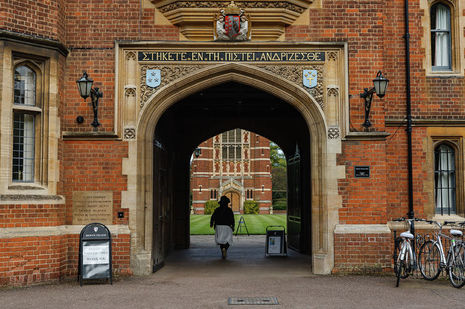Selwyn thanks students for ‘investing’ in ‘gilets and blankets’ amid heating cuts
Students have expressed their frustration at the College’s new heating policy, which aims to reduce Selwyn’s spending and carbon footprint

Selwyn students have been thanked by the College for “investing” in “bedsocks, gilets, vests and blankets” as heating is cut, apparently to reduce the College’s carbon footprint.
Students have expressed frustrations following heat and maintenance issues in the College.
Students have claimed that their central heating was not turned on until the 18th of October, despite the College promising to activate the heating from the 1st of that month.
Selwyn has told students that changes to its heating policy have been made to cut College expenditure, which could then alleviate costs for students. Many students have labelled the move hypocritical, as college rent has increased again this academic year.
The College has the third-highest 30-week rent in the University, at a median cost of £5,900. College rent increased by 7% for the 2022-2023 academic year and again by 10% at the start of this year.
Selwyn students complained online about the lack of heating at the College, following the cold spell earlier this week.
One student wrote: “Can we sign an open letter to get the heating on — it’s fucking freezing.”
The college Bursar had told students that “from 1 Oct-15 Nov heating is on in residences from 7-9am and 7-9pm.” Following the 15th of November, the heating will be turned on all day until the spring.
However, students living in Selwyn College’s Old Court have reported that their heating did not turn on until the 18th of October.
The Selwyn Bursar stated in the email to students that “older buildings have inbuilt circulation challenges, not always predictable. For example, it seems from the pattern of tickets received this week that the Old Court’s pipes have taken in air” and “will need ‘bleeding’ to let the air out.”
The Selwyn Bursar also wrote to students that the College is “grateful to all those investing in bedsocks, gilets, vests and blankets to help support this attempt to reduce our carbon footprint.”
The College has stated that the new heating policy was developed “in consultation with the student body,” through its Sustainability Working Group.
Selwyn students have questioned the sustainability of such measures, notably the fact that heating is turned on all day in the college bar and library.
Selwyn students have expressed frustration at the general price increases in College and the simultaneous cuts in living quality, following a failed attempt at a rent strike last term.
A student told Varsity: “My college rent in first year for an en-suite set room was £184 a week. In my third year, it was raised to £219 for a room without an ensuite.”
“The justification for the increase was the cost of living crisis and the increase of heating costs, but heating hours have been reduced. The rent should not have increased by this much if the heating is limited the way it is. College isn’t being open enough about changes they’re making,” they said.
Matthew Doyle, the Accommodation Officer representative of the Selwyn JCR, disclosed to Varsity: “The price of gas and electricity has significantly increased in the past two years. The measures taken by College to limit heating in the first part of term means that money can be saved, which means these savings can be passed onto students”.
Such changes “will take time to implement and College has decided that this current course of action is the best in the short term,” Doyle said.
“There are improvements that College can make to the way they communicate this information, but it is also important that students let maintenance know when there are issues with their rooms such as radiators not working,” Doyle concluded.
Jennifer Phillips, the college Bursar, told Varsity: “This [heating policy] is designed to reduce energy use and to keep rents lower than they would otherwise be. This policy was agreed by the college’s accommodation committee and by its college council, both of which have representatives from the JCR and the MCR who supported the initiative.”
 Comment / College rivalry should not become college snobbery30 January 2026
Comment / College rivalry should not become college snobbery30 January 2026 News / Downing Bar dodges college takeover31 January 2026
News / Downing Bar dodges college takeover31 January 2026 News / Cambridge for Palestine hosts sit-in at Sidgwick demanding divestment31 January 2026
News / Cambridge for Palestine hosts sit-in at Sidgwick demanding divestment31 January 2026 Science / Meet the Cambridge physicist who advocates for the humanities30 January 2026
Science / Meet the Cambridge physicist who advocates for the humanities30 January 2026 Features / Are you more yourself at Cambridge or away from it? 27 January 2026
Features / Are you more yourself at Cambridge or away from it? 27 January 2026









